International Affairs
 |
 |
 |
 |
 |
 |
 |
China, Russia & Tucker Carlson
Tucker Carlson hosts one of the most informative news/commentary shows on television. His segments on China provide valuable insights into the very real threat posed by the Peoples Republic of China (PRC). Carlson's efforts are particularly significant because little is said about the dangers of the PRC in the U.S. mass media.
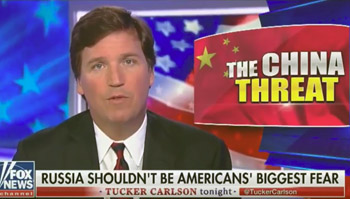 Unfortunately, Carlson at the same time portrays the Russian Federation as a relatively unimportant rival to the U.S., at least compared to the rising power of the Peoples Republic of China.The reality is that Russia is not only a powerful enemy by itself, but that Moscow is allied with Beijing against the United States. It is not a matter of if the United States will be forced to confront Russia or China, but that we are at this moment facing a military threat from the two combined.
Unfortunately, Carlson at the same time portrays the Russian Federation as a relatively unimportant rival to the U.S., at least compared to the rising power of the Peoples Republic of China.The reality is that Russia is not only a powerful enemy by itself, but that Moscow is allied with Beijing against the United States. It is not a matter of if the United States will be forced to confront Russia or China, but that we are at this moment facing a military threat from the two combined.
One of Carlson's guests quite rightly stated that the Peoples Republic of China has waged an effective charm campaign to mislead the American people as to its true intentions. Until the Chinese Communist revolution, America had a soft spot in its heart for China. When the European powers in the late 19th and early 20th century attempted to carve imperial China into separate enclaves, the U.S. government worked for an "Open Door" to China.
During the 1920s and 1930s various schools in the United States collected funds from students to save starving Chinese children who were either caught between warring military factions or victims of natural disasters. Even in the worst of times, China's image was that of a place of grace, good manners and even elegance.
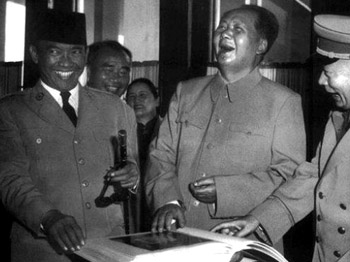 During WWII, the Chinese government of Chiang Kai-shek was closely allied with the United States. In the Chinese Civil War, which raged before and after WWII, the communist leader Mao Tse Tung was portrayed by sympathetic (and sometimes pro-communist) U.S. journalists as merely an "agrarian reformer." Upon his victory in 1949, the unmitigated cruelty of Mao's victorious communists came as a rude shock to America.
During WWII, the Chinese government of Chiang Kai-shek was closely allied with the United States. In the Chinese Civil War, which raged before and after WWII, the communist leader Mao Tse Tung was portrayed by sympathetic (and sometimes pro-communist) U.S. journalists as merely an "agrarian reformer." Upon his victory in 1949, the unmitigated cruelty of Mao's victorious communists came as a rude shock to America.
After the collapse of the Soviet Union, America hoped that the Communist Party in China would fall next, and billions in economic investment flowed into the Peoples Republic. The communist Chinese leaders, from the old revolutionary Mao himself to his successors and their underlings, all sported the warmest smiles accompanied by various levels of cooperation.
After all the good feeling, cooperation and investment, the PRC's aggression in the South China Sea and its challenge to the U.S. Navy came again as a blow to many Americans. This was not supposed to have happened. The Communist Party in China not only failed to fade away, but under president Xi Jinping, the Party has affirmed its devotion to the ideas of the Russian Communist revolutionary leader Vladimir (sometimes Nikolai) Lenin.
U.S. tech firms, incidentally, have been instrumental in supplying the hardware and software used by the Chinese secret police to keep the Chinese people in line.
Russia, currently named the Russian Federation, has not enjoyed the same degree of traditionally warm sentiment as has China. In its imperial period, the Tsar was seen as a bloody despot without redeeming qualities. The Russians often saw themselves as beset by invaders from East and West.
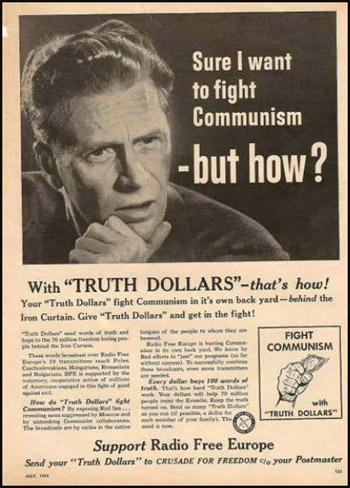 For centuries there was also a sense of religious messianism, which separated Russia from the rest of the world while sometimes appearing as strange, suspicious, even brutish to the outside world. During the Russo-Japanese War, U.S. President Theodore Roosevelt openly favored the rising Japanese Empire against the Tsar and his realm while attempting to end the hostilities (in which the Russians did very poorly).
For centuries there was also a sense of religious messianism, which separated Russia from the rest of the world while sometimes appearing as strange, suspicious, even brutish to the outside world. During the Russo-Japanese War, U.S. President Theodore Roosevelt openly favored the rising Japanese Empire against the Tsar and his realm while attempting to end the hostilities (in which the Russians did very poorly).
The indiscriminate bloodshed during the Bolshevik takeover of the Russian government and the ensuing civil war scandalized America and Lenin's pledge to engage in world revolution enraged many influential Americans. While America did come to the aid of starving Russians after the Russian Civil War (made possible, in part, by Lenin's claim to move away from the tenets of Communism), most Americans still failed to develop any real trust in Russia and its later manifestation, the Union of Soviet Socialist Republics (USSR).
There was a brief period of support for our "gallant Soviet allies" in WWII, when the mass murderer Josef Stalin was referred to as "Uncle Joe" by President Franklin Roosevelt. But afterwards, the Soviet occupation of Eastern Europe again ignited anti-Russian sentiment, as did Moscow's world-wide aggression expressed in the "Cold War".
When the Soviet flag over the Kremlin was lowered for the last time, there was great hope not only for the future of a "new Russia," but eventually for a free China as well.
The first ever president of Russia, Boris Yeltsin, spoke to a joint session of the U.S. Congress in 1992. Among other statements, he said that the "idol" of Communism had "collapsed" and declared that "free and democratic Russia is extending its hand of friendship to the people of America."
While investments did flow into Russia, along with visits by various powerful business and political figures, the period of close friendship with the U.S. did not last long. In 1997, Yeltsin and Jiang Zemen of the Peoples Republic of China issued a joint statement regarding the establishment of a "multi-polar" New World Order in which the United States and its democratic values would play only a subsidiary role.
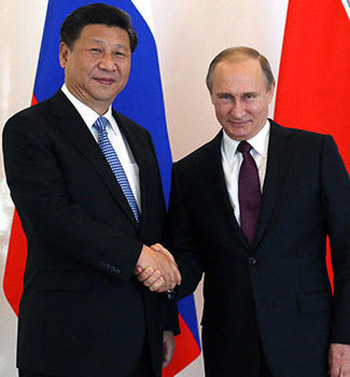 A Moscow-Beijing alliance was not supposed to happen. In the mid to late 1990s and into the early 21st century, various pundits explained that Russia needed the U.S. against a growing Chinese threat. Past military encounters, geographic rivalry and population trends were cited.
A Moscow-Beijing alliance was not supposed to happen. In the mid to late 1990s and into the early 21st century, various pundits explained that Russia needed the U.S. against a growing Chinese threat. Past military encounters, geographic rivalry and population trends were cited.
Experts in the U.S. and Europe supposed that China's rise would be tempered by a rivalry with Russia in Central Asia and that Moscow would be driven to seek Western aid to counter the growing Chinese threat. As late as 2014, the noted British economics writer Ambrose Evans-Pritchard could rail against the " pieties of a Moscow-Beijing axis."
As subsequent events would prove, the Yeltsin-Jiang declaration was more than a passing diplomatic occurrence. Especially under Yeltsin's successor, Vladimir Putin, Russian cooperation with the PRC in all fields, especially militarily, has vastly expanded.
Politically, Moscow has no difficulty with China's aggressive position in the South China Sea and surrounding waters (all important for international sea trade), and the PRC supports Russia's overt and covert war against Ukraine. In April 2018, China's defense minister met his Russian counterpart in Moscow to "let the Americans know about the close ties between the armed forces of China and Russia".
It is not an either/or situation. The United States is facing a military threat from a Moscow-Beijing alliance. This is an unavoidable fact we must recognize and to which we need respond with fortitude and deep resolve.

Toby Westerman publishes
International News Analysis - Today
An uncompromising weekly analysis of the world situation
Contact T. Westerman at
www.inatoday.com
or P.O. BOX 5182, Rockford, ILL, 61125-0182

Tucker Carlson - right on China, wrong on Russia
One of Carlson's guests quite rightly stated that the Peoples Republic of China has waged an effective charm campaign to mislead the American people as to its true intentions. Until the Chinese Communist revolution, America had a soft spot in its heart for China. When the European powers in the late 19th and early 20th century attempted to carve imperial China into separate enclaves, the U.S. government worked for an "Open Door" to China.
During the 1920s and 1930s various schools in the United States collected funds from students to save starving Chinese children who were either caught between warring military factions or victims of natural disasters. Even in the worst of times, China's image was that of a place of grace, good manners and even elegance.

US media made sympathetic portrayals of Mao
After the collapse of the Soviet Union, America hoped that the Communist Party in China would fall next, and billions in economic investment flowed into the Peoples Republic. The communist Chinese leaders, from the old revolutionary Mao himself to his successors and their underlings, all sported the warmest smiles accompanied by various levels of cooperation.
After all the good feeling, cooperation and investment, the PRC's aggression in the South China Sea and its challenge to the U.S. Navy came again as a blow to many Americans. This was not supposed to have happened. The Communist Party in China not only failed to fade away, but under president Xi Jinping, the Party has affirmed its devotion to the ideas of the Russian Communist revolutionary leader Vladimir (sometimes Nikolai) Lenin.
U.S. tech firms, incidentally, have been instrumental in supplying the hardware and software used by the Chinese secret police to keep the Chinese people in line.
Russia, currently named the Russian Federation, has not enjoyed the same degree of traditionally warm sentiment as has China. In its imperial period, the Tsar was seen as a bloody despot without redeeming qualities. The Russians often saw themselves as beset by invaders from East and West.

During the Cold War Communist Russia was presented as a great threat to freedom
The indiscriminate bloodshed during the Bolshevik takeover of the Russian government and the ensuing civil war scandalized America and Lenin's pledge to engage in world revolution enraged many influential Americans. While America did come to the aid of starving Russians after the Russian Civil War (made possible, in part, by Lenin's claim to move away from the tenets of Communism), most Americans still failed to develop any real trust in Russia and its later manifestation, the Union of Soviet Socialist Republics (USSR).
There was a brief period of support for our "gallant Soviet allies" in WWII, when the mass murderer Josef Stalin was referred to as "Uncle Joe" by President Franklin Roosevelt. But afterwards, the Soviet occupation of Eastern Europe again ignited anti-Russian sentiment, as did Moscow's world-wide aggression expressed in the "Cold War".
When the Soviet flag over the Kremlin was lowered for the last time, there was great hope not only for the future of a "new Russia," but eventually for a free China as well.
The first ever president of Russia, Boris Yeltsin, spoke to a joint session of the U.S. Congress in 1992. Among other statements, he said that the "idol" of Communism had "collapsed" and declared that "free and democratic Russia is extending its hand of friendship to the people of America."
While investments did flow into Russia, along with visits by various powerful business and political figures, the period of close friendship with the U.S. did not last long. In 1997, Yeltsin and Jiang Zemen of the Peoples Republic of China issued a joint statement regarding the establishment of a "multi-polar" New World Order in which the United States and its democratic values would play only a subsidiary role.

2018, announced as the year of unbreakable alliance
Experts in the U.S. and Europe supposed that China's rise would be tempered by a rivalry with Russia in Central Asia and that Moscow would be driven to seek Western aid to counter the growing Chinese threat. As late as 2014, the noted British economics writer Ambrose Evans-Pritchard could rail against the " pieties of a Moscow-Beijing axis."
As subsequent events would prove, the Yeltsin-Jiang declaration was more than a passing diplomatic occurrence. Especially under Yeltsin's successor, Vladimir Putin, Russian cooperation with the PRC in all fields, especially militarily, has vastly expanded.
Politically, Moscow has no difficulty with China's aggressive position in the South China Sea and surrounding waters (all important for international sea trade), and the PRC supports Russia's overt and covert war against Ukraine. In April 2018, China's defense minister met his Russian counterpart in Moscow to "let the Americans know about the close ties between the armed forces of China and Russia".
It is not an either/or situation. The United States is facing a military threat from a Moscow-Beijing alliance. This is an unavoidable fact we must recognize and to which we need respond with fortitude and deep resolve.

Posted July 9, 2018
International News Analysis - Today
An uncompromising weekly analysis of the world situation
Contact T. Westerman at
www.inatoday.com
or P.O. BOX 5182, Rockford, ILL, 61125-0182
______________________
______________________
 Volume I |
 Volume II |
 Volume III |
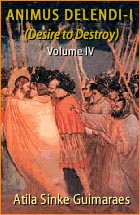 Volume IV |
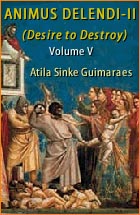 Volume V |
 Volume VI |
 Volume VII |
 Volume VIII |
 Volume IX |
 Volume X |
 Volume XI |
 Special Edition |


